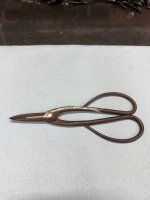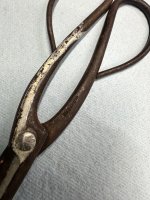I don't think there is much of a market for old rusty Japanese scissors. Maybe if they were made by a very famous blacksmith or something like that (or as
@rockm says, used by a famous bonsai artist). Masakuni is a common brand that makes lower-end and higher-end tools, so they might have some value, but without knowing the type of steel used or what product line they are from, it's difficult to gauge their value.
Kurashige is a good reference point;
they sold these new old stock Masakuni scissors for $46. If you look online, you can find this brand for sale for over $100, but most Japanese tools found at shops that cater to Westerners have absurd markups (2-4x what they sell for in Japan), so take that with a grain of salt.
If you're cleaning them up, I would not recommend taking the forge black/oxidized finish off of them completely. Just take it off the cutting edges of the blades. If there is some loose rust on the handles, knock that off with a mild abrasive, like a Scotch Brite pad or fine steel wool. But keep the oxidized coating. Stripping them back to silver will make them rust much faster, and if they are collectible, will hurt the value quite a bit.
When you're done, oil them so they don't rust as easily, and oil them again every time you sharpen (or maybe more often). I like a drying oil like polymerized linseed oil (it dries faster than regular linseed). Camellia oil is a traditional option, but is non-drying or takes a very long time to dry, so it's not much first choice.
I wouldn't worry about them being priceless heirlooms. I would put them to use if I were you.



